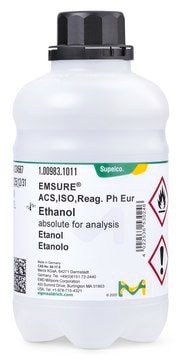1.00063
Acetic acid (glacial)
100%, anhydrous for analysis EMSURE® ACS,ISO,Reag. Ph Eur
Synonym(s):
Acetic acid, Ethanoic acid, Glacial acetic acid
About This Item
Recommended Products
product name
Acetic acid (glacial) 100%, anhydrous for analysis EMSURE® ACS,ISO,Reag. Ph Eur
grade
ACS reagent
Quality Level
Agency
reag. ISO
reag. Ph. Eur.
vapor density
2.07 (vs air)
vapor pressure
15.4 hPa ( 20 °C)
product line
EMSURE®
Assay
≥99.8% (alkalimetric)
form
liquid
autoignition temp.
485 °C
800 °F
potency
3310 mg/kg LD50, oral (Rat)
expl. lim.
16 %, 92 °F
4 %, 59 °F
technique(s)
UV/Vis spectroscopy: suitable
refractive index
n20/D 1.371 (lit.)
pH
2.5 (20 °C, 50 g/L in H2O)
kinematic viscosity
1.17 cSt(20 °C)
bp
117-118 °C (lit.)
mp
16.2 °C (lit.)
transition temp
flash point 39 °C
solubility
soluble 602.9 g/L
density
1.04 g/mL at 25 °C (lit.)
anion traces
chloride (Cl-): ≤0.4 ppm
phosphate (PO43-): ≤0.4 ppm
sulfate (SO42-): ≤0.4 ppm
cation traces
Ag: ≤0.005 ppm
Al: ≤0.020 ppm
As: ≤0.010 ppm
Au: ≤0.010 ppm
B: ≤0.100 ppm
Ba: ≤0.010 ppm
Be: ≤0.005 ppm
Bi: ≤0.050 ppm
Ca: ≤0.100 ppm
Cd: ≤0.020 ppm
Co: ≤0.010 ppm
Cr: ≤0.020 ppm
Cu: ≤0.010 ppm
Fe: ≤0.050 ppm
Ga: ≤0.050 ppm
Ge: ≤0.020 ppm
Hg: ≤0.005 ppm
In: ≤0.050 ppm
K: ≤0.100 ppm
Li: ≤0.010 ppm
Mg: ≤0.050 ppm
Mn: ≤0.010 ppm
Mo: ≤0.010 ppm
Na: ≤0.200 ppm
Ni: ≤0.020 ppm
Pb: ≤0.010 ppm
Pt: ≤0.100 ppm
Sn: ≤0.050 ppm
Sr: ≤0.010 ppm
Ti: ≤0.050 ppm
Tl: ≤0.020 ppm
V: ≤0.010 ppm
Zn: ≤0.030 ppm
Zr: ≤0.050 ppm
heavy metals (as Pb): ≤0.5 ppm
SMILES string
[F2C(F2C)13F3C]C(O)=O
storage temp.
15-25°C
InChI
1S/C2H4O2/c1-2(3)4/h1H3,(H,3,4)
InChI key
QTBSBXVTEAMEQO-UHFFFAOYSA-N
Looking for similar products? Visit Product Comparison Guide
Related Categories
General description
Features and Benefits
- Streamlined lab work
- Time and cost savings
- Superior comparability of results
- Certainty during product use
- Accuracy regarding impurities
- Confidence in analysis and production
Legal Information
Signal Word
Danger
Hazard Statements
Precautionary Statements
Hazard Classifications
Eye Dam. 1 - Flam. Liq. 3 - Skin Corr. 1A
Storage Class Code
3 - Flammable liquids
WGK
WGK 1
Flash Point(F)
102.2 °F
Flash Point(C)
39 °C
Certificates of Analysis (COA)
Search for Certificates of Analysis (COA) by entering the products Lot/Batch Number. Lot and Batch Numbers can be found on a product’s label following the words ‘Lot’ or ‘Batch’.
Already Own This Product?
Find documentation for the products that you have recently purchased in the Document Library.
Customers Also Viewed
Articles
HPTLC-MS was used to analyze stevioside and rebaudioside in artificial sweeteners, stevia plants, cola and isotonic drinks with a minimum of sample preparation.
Protocols
Photometric determination with Ammonium vanadate
Ascorbic acid in fruit juices - photometric determination with Tillmann's reagent
Aripiprazole is an atypical antipsychotic and a partial dopamine agonist. It is primarily used in the treatment of schizophrenia, bipolar disorder, major depressive disorder, tic disorders, and irritability associated with autism. Aripiprazole was first approved by the U.S. Food and DrugAdministration in November 2002 for schizophrenia and by the European Medicines Agency in June 2004 for acute manic and mixed episodes associated with bipolar disorder.
broad spectrum insecticide, egradation product, phenylpyrazole pesticide, World Health Organization (WHO), HPLC, UV, testing of Fipronil and Fipronil sulfone in Food
Related Content
Glass bottles are ideal for storing acids because they are inert and offer a long shelf life.
Our team of scientists has experience in all areas of research including Life Science, Material Science, Chemical Synthesis, Chromatography, Analytical and many others.
Contact Technical Service






